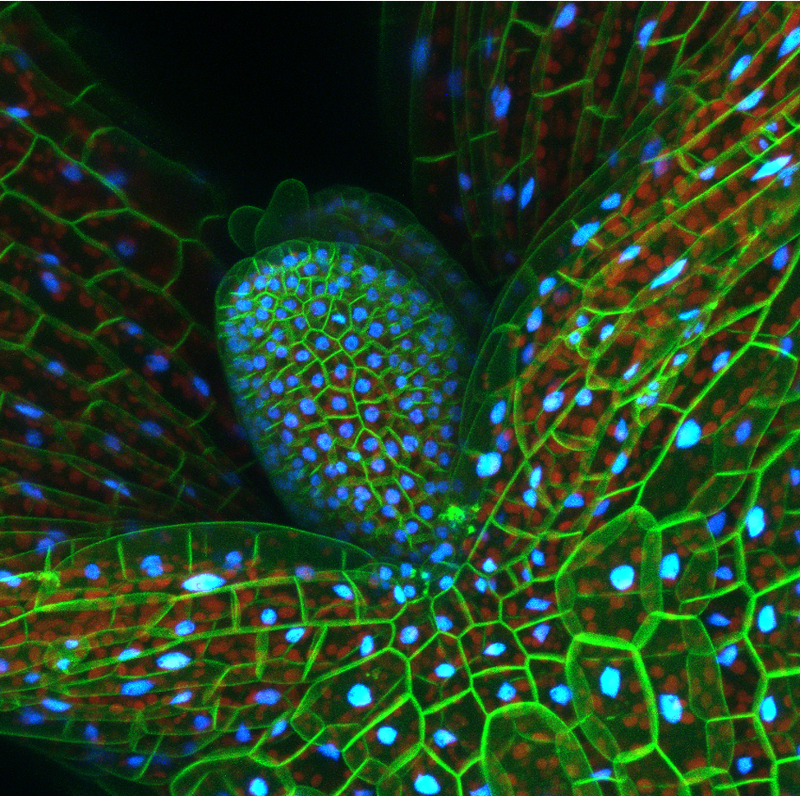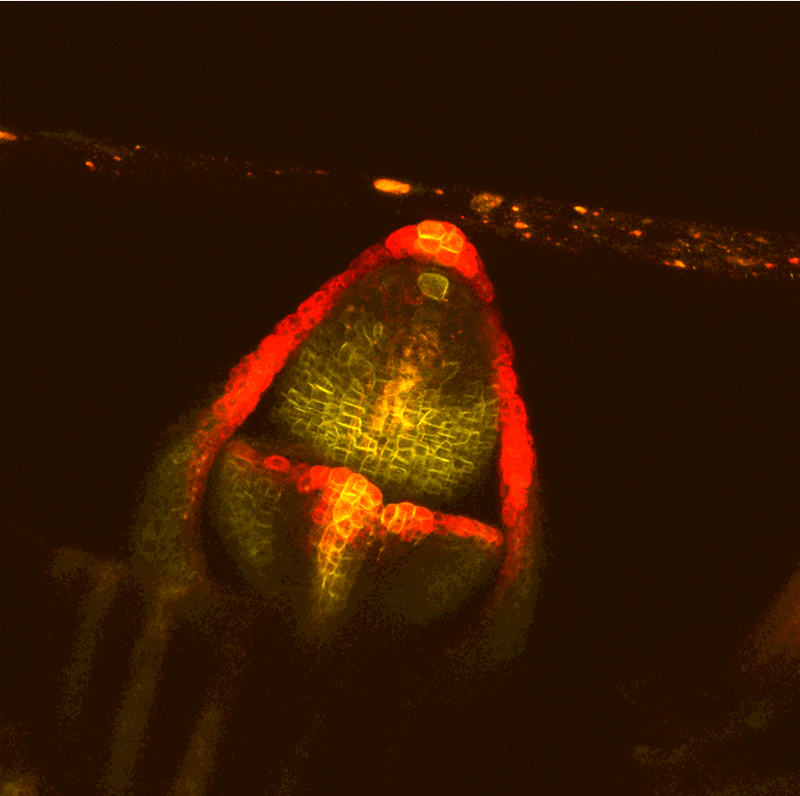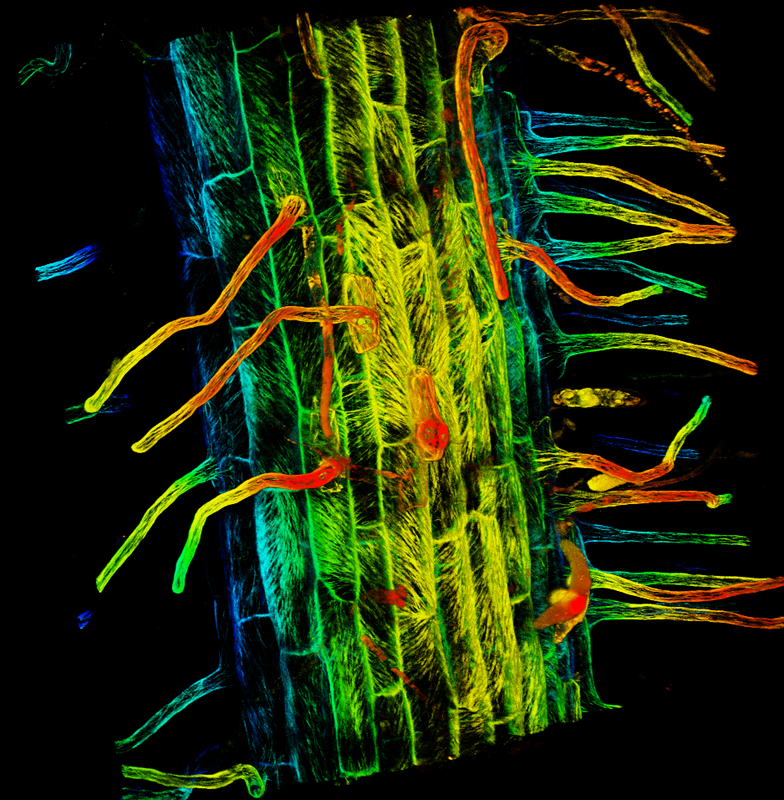Registration
You must register for the ICAR 2021 conference in order to attend these symposia.
From Molecules to Organs: Quantitative Imaging in Plant Biology
Marisa Otegui, University of Wisconsin-Madison, USA
Daniel Kierzkowski, University of Montreal, Canada
Charlotte Kirchhelle, University of Oxford, UK
Date: Monday, June 21, 2021
Time: 1:30 - 2:45 PM PDT
How do plants robustly and reproducibly generate their organ shapes? Organogenesis is highly complex and involves multiple scales in space and time, posing a significant experimental challenge. Recent technological improvements in fluorescence microscopy and advances in image analysis enable the quantification of cellular growth patterns across entire organs and concomitant sub-cellular events with unprecedented details. During this mini-symposium, we will explore the central role of quantitative live-imaging of plant growth to answer important questions in contemporary developmental biology. Imaging technologies in biology are growing and diversifying at an exponential rate, from being able to capture details of molecules at nearly atomic resolution to imaging whole crop fields in non-invasive manners. New light-based and correlative imaging approaches enable researchers to image cells and tissues in a label-free, multiscale manner to obtain both dynamic and molecular information during cellular processes and cell signaling. Many of these emerging techniques have first been developed for animal models and their application to plant research offers unexplored possibilities and advantages. Our symposium aims to provide an overview of recent growth studies in various plant organs and tissues and to discuss application of emerging imaging modes for both high resolution and highly dynamic processes in plant biology.
Speakers:
Daniel Kierzkowski, University of Montreal, Canada
Charlotte Kirchhelle, University of Oxford, UK
Date: Monday, June 21, 2021
Time: 1:30 - 2:45 PM PDT
How do plants robustly and reproducibly generate their organ shapes? Organogenesis is highly complex and involves multiple scales in space and time, posing a significant experimental challenge. Recent technological improvements in fluorescence microscopy and advances in image analysis enable the quantification of cellular growth patterns across entire organs and concomitant sub-cellular events with unprecedented details. During this mini-symposium, we will explore the central role of quantitative live-imaging of plant growth to answer important questions in contemporary developmental biology. Imaging technologies in biology are growing and diversifying at an exponential rate, from being able to capture details of molecules at nearly atomic resolution to imaging whole crop fields in non-invasive manners. New light-based and correlative imaging approaches enable researchers to image cells and tissues in a label-free, multiscale manner to obtain both dynamic and molecular information during cellular processes and cell signaling. Many of these emerging techniques have first been developed for animal models and their application to plant research offers unexplored possibilities and advantages. Our symposium aims to provide an overview of recent growth studies in various plant organs and tissues and to discuss application of emerging imaging modes for both high resolution and highly dynamic processes in plant biology.
Speakers:
- Charlotte Kirchhelle (University of Oxford)
- Richard Vierstra (Washington University at St. Louis)
- Marisa Otegui (University of Wisconsin-Madison)
- Lily Cheung (Georgia Institute of Technology)
- Agata Burian (University of Silesia in Katowice)
- Daniel Kierzkowski (University of Montreal)
- Dorothee Stockle (University of Zurich)
The Arabidopsis Algorithm: Mathematical Modeling in Plant Biology
Kari Miller, Washington University in St. Louis, USA
Date: Monday, June 21, 2021
Time: 5:00 - 6:15 PM PDT
Computational and mathematical models are fast becoming indispensable tools for mechanistic studies of complex biological processes, ranging from the molecular to the developmental to the ecological. In addition, some funding agencies have made modeling an important component of grant applications. As a result, plant biologists have been quick to make use of these approaches, resulting in new insights into many research questions. This series of speakers will demonstrate several diverse applications of mathematical modeling to plant biology, particularly how modeling can be used to predict physiological responses, guide future experiments, and clarify otherwise convoluted biological processes. We anticipate that a symposium on this timely topic would update the audience on new discoveries in plant biology and how mathematical modeling helped with those discoveries. In addition, it will continue to solidify this nascent community of Arabidopsis biologists.
Speakers:
Date: Monday, June 21, 2021
Time: 5:00 - 6:15 PM PDT
Computational and mathematical models are fast becoming indispensable tools for mechanistic studies of complex biological processes, ranging from the molecular to the developmental to the ecological. In addition, some funding agencies have made modeling an important component of grant applications. As a result, plant biologists have been quick to make use of these approaches, resulting in new insights into many research questions. This series of speakers will demonstrate several diverse applications of mathematical modeling to plant biology, particularly how modeling can be used to predict physiological responses, guide future experiments, and clarify otherwise convoluted biological processes. We anticipate that a symposium on this timely topic would update the audience on new discoveries in plant biology and how mathematical modeling helped with those discoveries. In addition, it will continue to solidify this nascent community of Arabidopsis biologists.
Speakers:
- Charles Anderson (Penn State University)
- Rajib Saha (University of Nebraska, Lincoln)
- Fei Du (Chinese Academy of Sciences)
- Satoyo Oya (The University of Tokyo)
- Valerie Fraser (Oregon State University)
Quantitative Development in the Digital World
Margaret Frank, Cornell University, USA
Sam Leiboff, Oregon State University, USA
Date: Tuesday, June 22, 2021
Time: 1:30 - 2:45 PM PDT
From digital profiles of single-cell identities to mathematical reconstructions of 3-dimensional plant morphology, quantitative biology is transforming our fundamental understanding of plant development. The goal of this mini-symposium is to bring together researchers who integrate molecular genetic, mathematical, and/or morphological approaches from diverse experimental systems to discuss emerging quantitative, data-driven models for plant development. Possible topics include: precision profiling of developmental state transitions; role of molecular stochasticity in developmental processes; quantifying morphological plasticity; and integrating biophysics into developmental networks.
Speakers:
Sam Leiboff, Oregon State University, USA
Date: Tuesday, June 22, 2021
Time: 1:30 - 2:45 PM PDT
From digital profiles of single-cell identities to mathematical reconstructions of 3-dimensional plant morphology, quantitative biology is transforming our fundamental understanding of plant development. The goal of this mini-symposium is to bring together researchers who integrate molecular genetic, mathematical, and/or morphological approaches from diverse experimental systems to discuss emerging quantitative, data-driven models for plant development. Possible topics include: precision profiling of developmental state transitions; role of molecular stochasticity in developmental processes; quantifying morphological plasticity; and integrating biophysics into developmental networks.
Speakers:
- Sam Leiboff (Oregon State University)
- Annis Richardson (University of Edinburgh)
- Mao Li (Danforth Center)
- Yuchen Long (National University of Singapore)
- Emilie Demarsy (University of Geneva)
- Yan Gong (Stanford University)
Advancing Quantitative Proteomics in Plant Science
R. Glen Uhrig, University of Alberta, Canada
Date: Wednesday, June 23, 2021
Time: 5:30 - 6:45 AM PDT
To date, our systems-level understanding of plant cell regulation has largely been derived from a combination of genetic and transcriptomic analysis, with comparatively little information available about global protein-level regulation and its impacts on the plant cell environment. Over the past decade extraordinary advancements in quantitative proteomic workflows and technologies now provides exceptional opportunities for characterizing dynamic temporal and spatial changes in the molecular plant cell environment (e.g., post-translational modifications). With proteins representing the outward facing functional elements of the plant cell, they are especially important to advancing our fundamental understanding on plant biology. The goal of this mini-symposium will be to highlight the latest advancements in quantitative plant proteomics and its diverse applications across plant science.
Speakers:
Date: Wednesday, June 23, 2021
Time: 5:30 - 6:45 AM PDT
To date, our systems-level understanding of plant cell regulation has largely been derived from a combination of genetic and transcriptomic analysis, with comparatively little information available about global protein-level regulation and its impacts on the plant cell environment. Over the past decade extraordinary advancements in quantitative proteomic workflows and technologies now provides exceptional opportunities for characterizing dynamic temporal and spatial changes in the molecular plant cell environment (e.g., post-translational modifications). With proteins representing the outward facing functional elements of the plant cell, they are especially important to advancing our fundamental understanding on plant biology. The goal of this mini-symposium will be to highlight the latest advancements in quantitative plant proteomics and its diverse applications across plant science.
Speakers:
Exploring the Single-cell Landscape of Arabidopsis
Travis Lee, Salk Institute, USA
Joseph Swift, Salk Institute, USA
Rachel Shahan, Duke University, USA
Josh Cuperus, University of Washington-Seattle, USA
Christine Queitsch, University of Washington-Seattle, USA
Date: Thursday, June 24, 2021
Time: 12:00 - 1:15 PM PDT
Recently, there has been a dramatic increase in both the breadth and scope of single-cell sequencing methodologies. Utilization of these techniques has permitted the investigation of cell-types, tissues, and whole organisms with unprecedented resolution. Plants present unique challenges for the application of single-cell methodologies, yet the field of single-cell genomics in Arabidopsis is rapidly emerging. Several published or preprint manuscripts have emerged recently that describe high-throughput single-cell sequencing technologies in several plant species, signaling that efforts toward the generation of single-cell atlases of Arabidopsis is well underway. Currently available manuscripts focused on the Arabidopsis root, and were able to (1) confirm the presence of known cell-type and tissue-type markers in appropriately grouped cells and (2) identify novel cell-type markers with greater specificity and transcript accumulation than well-known marker genes. We believe a mini-symposium focusing on Arabidopsis single-cell applications would allow the research community to showcase these powerful yet nascent technologies. Because of the genetic tools in Arabidopsis, and the anatomical and expression patterns known in Arabidopsis, it will be the first and best opportunity to apply single-cell methods. Several new techniques and technologies are being applied to Arabidopsis and can be explored in this session.
Speakers:
Joseph Swift, Salk Institute, USA
Rachel Shahan, Duke University, USA
Josh Cuperus, University of Washington-Seattle, USA
Christine Queitsch, University of Washington-Seattle, USA
Date: Thursday, June 24, 2021
Time: 12:00 - 1:15 PM PDT
Recently, there has been a dramatic increase in both the breadth and scope of single-cell sequencing methodologies. Utilization of these techniques has permitted the investigation of cell-types, tissues, and whole organisms with unprecedented resolution. Plants present unique challenges for the application of single-cell methodologies, yet the field of single-cell genomics in Arabidopsis is rapidly emerging. Several published or preprint manuscripts have emerged recently that describe high-throughput single-cell sequencing technologies in several plant species, signaling that efforts toward the generation of single-cell atlases of Arabidopsis is well underway. Currently available manuscripts focused on the Arabidopsis root, and were able to (1) confirm the presence of known cell-type and tissue-type markers in appropriately grouped cells and (2) identify novel cell-type markers with greater specificity and transcript accumulation than well-known marker genes. We believe a mini-symposium focusing on Arabidopsis single-cell applications would allow the research community to showcase these powerful yet nascent technologies. Because of the genetic tools in Arabidopsis, and the anatomical and expression patterns known in Arabidopsis, it will be the first and best opportunity to apply single-cell methods. Several new techniques and technologies are being applied to Arabidopsis and can be explored in this session.
Speakers:
- Rachel Shahan (Duke University)
- Kenneth Birnbaum (New York University)
- Siobahn Brady (University of California, Davis)
- Camila Lopez-Anido (Stanford University)
- Jie Zhu (University of California, Davis)
- Sami Saarenpaa (KTH Royal Institute of Technology)
Arabidopsis Informatics
Nicholas Provart, University of Toronto, Canada
Eva Huala, TAIR/Phoenix Bioinformatics, USA
Tanya Berardini, TAIR/Phoenix Bioinformatics, USA
Date: Friday, June 25, 2021
Time: 10:00 - 11:15 AM PDT
In spite of the Arabidopsis thaliana Col-0 genome having been sequenced in 2000, around 50% of its genes still lack a meaningful Gene Ontology Molecular Function or Biological Process annotation. This workshop will cover Arabidopsis informatics resources, both established and new, for understanding Arabidopsis genomes and for generating quality hypotheses about gene function. TAIR, the BAR, 1001 Genomes, the Ecker Lab, as well as speakers selected from abstract submissions, will present updates and new tools.
Speakers:
Eva Huala, TAIR/Phoenix Bioinformatics, USA
Tanya Berardini, TAIR/Phoenix Bioinformatics, USA
Date: Friday, June 25, 2021
Time: 10:00 - 11:15 AM PDT
In spite of the Arabidopsis thaliana Col-0 genome having been sequenced in 2000, around 50% of its genes still lack a meaningful Gene Ontology Molecular Function or Biological Process annotation. This workshop will cover Arabidopsis informatics resources, both established and new, for understanding Arabidopsis genomes and for generating quality hypotheses about gene function. TAIR, the BAR, 1001 Genomes, the Ecker Lab, as well as speakers selected from abstract submissions, will present updates and new tools.
Speakers:
- Nicholas Provart / Sylva Donaldson (University of Toronto)
- Tanya Berardini (TAIR/Phoenix Bioinformatics)
- Travis Lee (Salk Institute)
- Arthur Korte (University of Wuerzburg)
- Daphne Ezer (University of York)
- Muhammad Khokhar (University of Lancaster)
- Angel Ferrero-Serrano (Pennsylvania State University)







